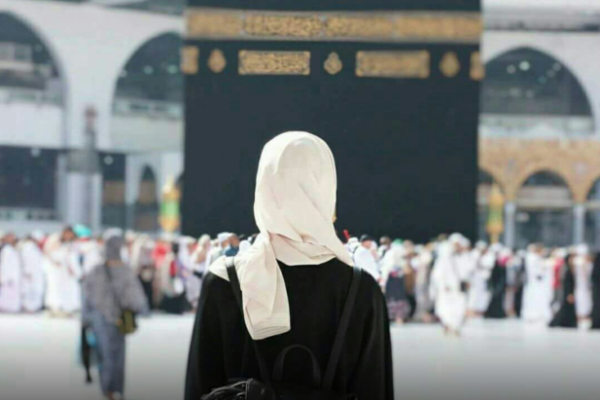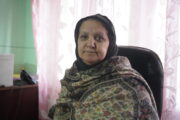In February of 2018, inspired by the #MeToo movement, Muslim women took to social media to describe sexual harassment and assault in the holiest shrines of the Islamic faith: the Kaabah in the Sacred Mosque of Mecca. Spearheaded by Egyptian feminist Mona Altahawy, Muslim women using the hashtag #MosqueMeToo have shared their experiences, many of them eerily common, in an effort to push for reform and bring awareness to the violence women experience in their places of worship. As we exit Hajj season 2018, with more than 2.3 million Muslims participating this year, many are wondering whether Saudi Arabia has implemented the changes necessary to make Mecca safe for all.
Hajj is a ritual pilgrimage to the city of Mecca that must be undertaken during a specific time of the year—a spiritual obligation that all Muslims must complete once in their life if they are physically and financially able. The pilgrimage entails a series of mandated rituals, some grueling and some inspirational. Hajj also represents the gathering of the Islamic Ummah, or community, and has become a symbol of the uniting of nations from around the globe, a diversity awe-inspiring in its magnitude.
For many Muslims, the pilgrimage to Mecca serves as a capstone for their lives and dedication to their faith. For example, 54 years ago, Malcolm X wrote his letter from Mecca, documenting the spiritual transformation he felt during his Hajj experience and changing his name, once more, to Al-Hajj Malik El-Shabazz:
I have been blessed to visit the Holy City of Mecca, I have made my seven circuits around the Ka’ba, led by a young Mutawaf named Muhammad, I drank water from the well of the Zam Zam. I ran seven times back and forth between the hills of Mt. Al-Safa and Al Marwah. I have prayed in the ancient city of Mina, and I have prayed on Mt. Arafat. There were tens of thousands of pilgrims, from all over the world. They were of all colors, from blue-eyed blondes to black-skinned Africans. But we were all participating in the same ritual, displaying a spirit of unity and brotherhood that my experiences in America had led me to believe never could exist between the white and non-white.
For Muslim women, the experience often involves hardships men do not have to endure, namely various forms of sexual assault. Since the #MosqueMeToo movement began, hundreds of women have shared their stories, and thousands of people have retweeted those accounts. Reading through the stories, one is struck by the common threads among them: Women being grabbed by the buttocks during Tawaf (the circling of the Kaabah at the start and end of Hajj); men pressing their erections into women’s backs during Tawaf; women having their breasts fondled while trying to kiss the Kaabah’s black stone; sexually explicit verbal harassment from men around the Sacred Mosque in Mecca.
Other women describe the complicity of Saudi guards and policemen in silencing women who report harassment. There are even reports of guards participating in the assaults themselves.
I have first-hand knowledge of this culture of misogyny and abuse in Mecca. I was 13 at the time and accompanied on the pilgrimage by my aunts, cousins, grandmother and grandfather. As a Muslim adolescent, I was filled with awe and excitement to be in the spiritual center of my faith. I was covered from head to toe, walking with my gaze to the floor, reciting the Quran as I left the Mosque, when I was accosted by a man who grabbed my developing breasts. At first, I shrugged off the assault as an accident—my young mind could not believe that someone would commit a sin so grave in the holiest shrine of my faith. The man must have thought I was an easy target, because the next time we crossed paths, he did it again. As I saw him coming at me for a third time, I yelled Haram! (Arabic for forbidden) before he was able to touch me. I was immediately hushed and chastised by a Saudi policeman for raising my voice in the Sacred Mosque. My aunt realized what had occurred and enfolded me in her arms and ushered me out of the Mosque as shook with fear and anger. This incident, etched into my mind, stripped me of my innocence.
As Saudi Arabia enters an era of so-called reform, Muslim women wonder if the Saudis will take the steps necessary to protect women from assault as they fulfill a fundamental tenet of their faith.
Altahawy has made several recommendations for reform. Her suggestions include having the imam of the Grand Mosque of Mecca give a sermon discussing the sexual assault of Muslim women in the holy shrine and demanding that men respect and protect women. Unfortunately, this year’s Hajj sermon did not address violence against women. She also urges better training for Saudi security personnel to help them recognize, stop and punish assault (along with including more women in the roster of security personnel). Some commenters fear that conservative clerics might respond to the criticism from Altahawy and others by separating men and women during Hajj in the future or, worse, by banning female participation altogether. Iranian women have used the movement to fundamentally question whether modesty laws protect women at all, as is their stated intention.
Saudi Arabia has embarked on a set of reforms under its broader national program, Vision 2030. The country’s widely reported lifting of the ban on female driving is one such reform, and a new sexual harassment law, which came into effect in June 2018, is another. While punishments such as flogging and imprisonment have been added to the books for those found guilty of harassment, the question of implementation, especially during Hajj, continues to loom.
In breaking their silence, Muslim women find themselves at a paradoxical crossroads, both fueling islamophobic hate with their accounts of sexual assault and seeking to fight patriarchal violence within the faith by reporting their experiences as observant Muslims. Similar to the #ChurchToo movement, which has brought awareness to sexual violence and harassment within Christianity, #MosqueMeToo seeks to expand the #MeToo movement to include institutions of faith. As the ongoing sexual abuse scandal in the Catholic Church has demonstrated, houses of worship are not immune from abusive behavior. The way forward involves listening to victims, acknowledging violence and implementing reforms to make such spaces safer for everyone.
With Hajj now complete, many wonder whether Saudi Arabia and the Muslim men who have undertaken this year’s pilgrimage have risen to the challenge of curbing gendered violence in sacred spaces. As pilgrims return home after celebrating Eid al Udha in the coming days, many are watching social media attentively, waiting to find out.
Hebah Farrag was the assistant director of research of the USC Center for Religion and Civic Culture through 2023.








